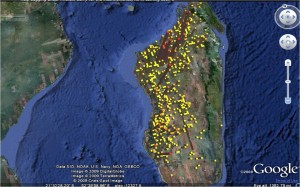As the world's nations gather today in Copenhagen for the United Nations Convention on Climate Change, Madagascar, having already lost 90% of its original forest, faces continued threats from black market logging. An illegal traffic of rosewood, a topic of conversation in the Malagasy mediasphere for a few months, has now been thoroughly exposed by an undercover team of investigators. The details of this very profitable traffic have been made public and shared by many citizen bloggers and scientific publications. The latest report produced by Global Witness and Environmental Investigation Agency (EIA) states that about $460,000 USD worth of trade is cut down each day, with enforcement efforts hampered by the continued absence of a government of national unity. The full report is available here (and in French here).
![Rosewood traffic Rosewood traffic, via Achille52 at http://reflexiums.wordpress.com[/caption]
The report contains <a href=](https://globalvoicesonline.org/wp-content/uploads/2009/12/rosewood-300x242.jpg) names of perpetrators and the volume of the illegal traffic.
names of perpetrators and the volume of the illegal traffic.
Malagasy blogger Achille quotes from the report (fr):
En 2009, huit navires porte-containers ont quitté Vohémar avec à leur bord un total de 19 730 rondins et 50 584 planches dans 324 containers autorisés par le MEF (voir Annexe 9). Cela revient à environ 9 700 tonnes de bois de rose.
Video showing the life of the villagers living in the area demonstrates that they clearly did not benefit from the rosewood traffic:
When one compares the $460,000 a day from the trade with the fact that 89% of the Malagasy population live with less than $2 a day, it is easy to understand why corruption and inequality are commonly regarded as the main obstacles to human development in Madagascar.
Another independent report supported by the Jane Goodall Institute Schweiz was published this week confirming the extent of what the authors, Schuurman and Lowry, call the “Madagascar Rosewood Massacre” (pdf).
The authors also contributed to this video to raise awareness of the extent of the loss in biodiversity due to the traffic:
The US Senate legislated on this issue and Congressman Blumenauer (D-Oregon) wrote in a statement:
After a coup in March, the new and weakened government of Andry Rajoelina issued sweeping decrees allowing the harvest and export of wood from protected forests and World Heritage Sites. The Obama administration has condemned the de facto government, and the Wildlife Conservation Society, the World Wildlife Fund (WWF), and Conservation International have denounced the wholesale exploitation of some of the world's most diverse forests and decimation of the local population's resources and livelihoods
The rosewood scandal have now had a serious impact in the political process of Madagascar. Former president Albert Zafy threatened to disclose names in the current Rajoelina government if a solution to unblock the deadlock over the government of national union is not found soon. The necessity to reach a government of national union is also pressed on by the conditionality of foreign investments by the United States ( AGOA and MCC) and the European Union (fr) (NB: 70% of the Malagasy government budget come from foreign aid).
Interestingly, this decree allowed for the legal investigation of Gibson guitars. Their headquarters were raided by the US Fish and Wildlife Service because the guitars were made from rosewood from the illegal traffic in Madagascar. Judging from reactions of Twitter users around the world, the fact that Gibson guitars were implicated provoked more reactions that the potential loss of the ring-tail lemur habitat.
The issue of deforestation in Madagascar is unfortunately not limited to rosewood trafficking. Slash and burn agriculture has caused much of the anthropogenic deforestation of the region. The NGO Vakanala has produced a remarkable 3D real time visualization of the numbers of bush fires affecting Madagascar:
image via http://vakanala.org

Rosewood via Achille52, at http://reflexiums.wordpress.com
Similarily, the Malagasy NGO Mistinjo has also focused its effort on capacity building of local communities that work towards forest restoration and carbon sequestration in Andasibe.
Local bloggers have been raising awareness over the loss of the national rain forest for a long time ago now. But they do more than just raising awareness, Patrick, a blogger from Tamatave, has been steadily replanting trees in the Toamasina region and involved many other associations in this process:







8 comments